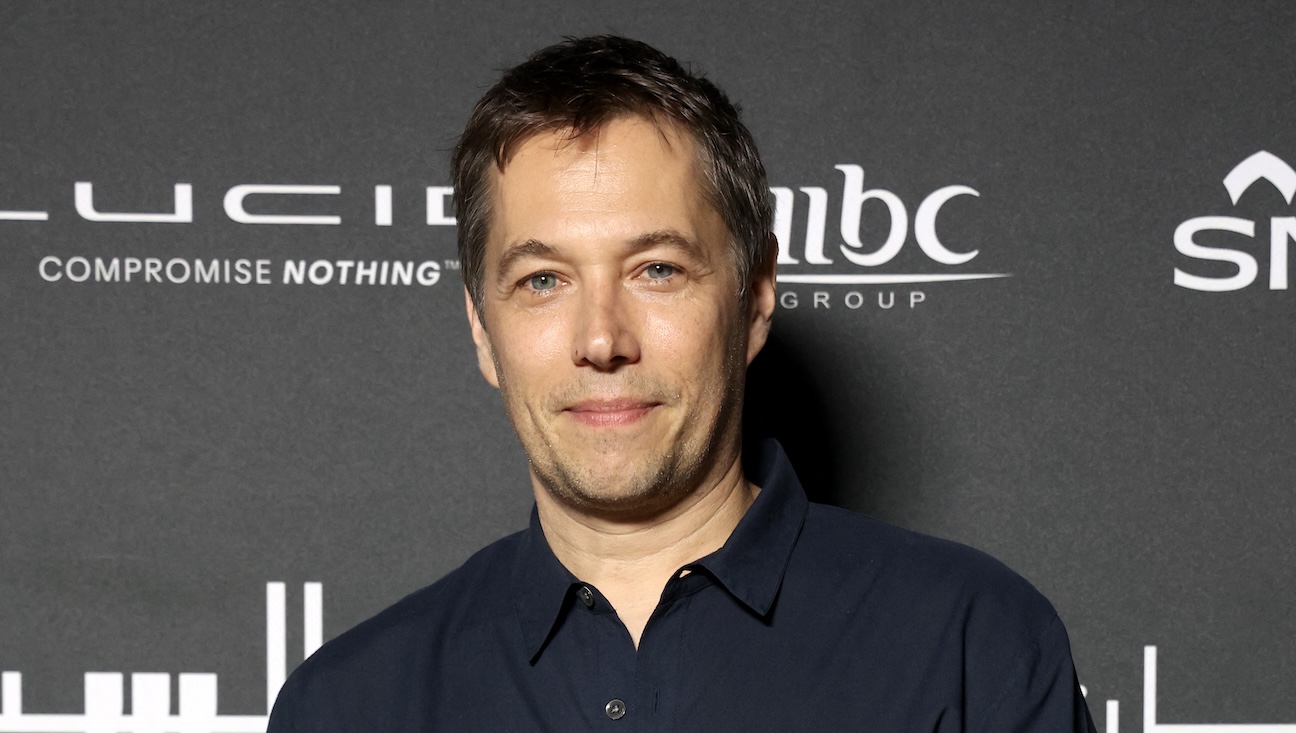Dystopia arrives with an alarming lack of specifics in Anniversary, a quiet thriller whose vagueness is precisely the terrifying point. Jan Komasa’s absorbing feature revolves around something called The Change, which used to be a euphemism for menopause and in this case is the brand name of a political crusade, one that aims to “put ‘united’ back in these States of America” by promulgating a “no-party system.” If you suspect that these descriptions are a form of Newspeak for a one-party system and a program of militant conformity, you would be correct.
Peppering dashes of humor into its brew of foreboding, the movie views the rise of an authoritarian movement through its effect on a family of unbelievers, covering a five-year period that begins in celebration and ends somewhere very different. The wider societal implications are implicit in Anniversary, if also open to interpretation in a Rorschach-test way.
Anniversary
Sly and chilling.
Komasa, director of Corpus Christi and Good Boy (the one about a teenage criminal, not the dog-vs.-ghosts horror film), keeps the story tightly focused on the Taylor family, whose members find themselves shockingly close to the seat of newfangled power after the architect of The Change marries into their clan. The terror plays out on an intimate scale among this collection of characters, all of them vividly drawn in sharp strokes by the writing — this is the first produced screenplay by Lori Rosene-Gambino — and by the deliciously watchable and sometimes unnerving performances from an uncommonly charismatic cast.
Ellen and Paul Taylor (Diane Lane and Kyle Chandler) are the kind of characters that often serve as stand-ins for America in Hollywood’s aspirational vision of the country: good-looking, professionally accomplished, and socially conscious in a basic left-leaning way. Their sprawling waterfront home in the Virginia suburbs of Washington, D.C., while not quite the picture of Nancy Meyers-ish perfection, has a familiar big-screen patina of upper-middle-class comfort. The family house (a Dublin property portraying an East Coast homestead) is the story’s physical center, and with excellent, subtle work by production designer Lucy Van Lonkhuyzen, it begins as an embodiment of connection and joy and, over several jumps in time, becomes a reflection of disintegration.
Ellen is a professor at Georgetown — apparently of political science or a related field — and Paul’s a chef and restaurateur. As the movie opens, their four children and a couple of dozen friends join them for a 25th wedding anniversary party in the backyard. They’re still very much in love, and they’re so effortlessly cool that at one point in the evening he says to her with a smile, “The kids found our weed stash.”
Those kids consist of three daughters and a son. The youngest, Birdie (Mckenna Grace), a high schooler and the only child still living at home, has a sensitive and quietly rebellious bohemian vibe and a head for science. She shares a strong bond with eldest sibling Anne (Madeline Brewer, who, like Grace, brings her dystopian bona fides from The Handmaid’s Tale). Wine-gulping and queer, Anne is a standup comedian whose career has taken off, and her gift to Birdie of a Putney Swope poster underscores this movie’s regard for what Anne lauds as “subversive satire” (a later throwaway nod to George Carlin emphasizes the point).
Their sister Cynthia has a somewhat more cynical attitude, and the priceless body language that goes with it. She’s played by Zoey Deutch, whose gift for wordless communication is in full flower here. Cynthia and her upwardly grasping husband, Rob (Daryl McCormack), are attorneys working together on environmental law, but they’re not on the same page. The disconnect becomes more painfully clear every time they’re onscreen, beginning with a comical interlude involving money talk and a red-light mask, and moving into devastatingly dark terrain.
With judgy interest, the three sisters observe Liz Nettles (Phoebe Dynevor), the new girlfriend of their nervous and nebbishy brother, Josh (Dylan O’Brien). Liz, first seen rehearsing her party chitchat before the bathroom mirror, has a strange, flat affect, an icy stare and a not-quite smile, and her every utterance has a predatory undercurrent, especially when she talks to Ellen, who was her professor eight years earlier.
Things did not end well between teacher and student after Ellen condemned Liz’s thesis for its “antidemocratic” philosophy — but she did so all in the spirit of intellectual exchange, she assures Paul. Ellen’s hackles are up at the unwelcome turn of events that places Liz back in her life, and she’s not happy to learn that Josh has abandoned his fiction writing and is instead focusing on providing editing support to Liz on what she calls, with ominous nebulousness, a “self-organizing guide.”
That guide, titled The Change: The New Social Contract, turns out to be a doorstop published by a mysterious enterprise with a deceptive downhome name, Cumberland Company. Soon it’s not just a best-seller but the catalyst of a movement. The movie might strategically skimp on details about the newly ascendant policies that result, but the size of the tome suggests that Liz has put a few of the particulars in writing.
What Komasa gives us are samples of slick videos produced by the Cumberland Company that extol the values of freedom, dignity, destiny and, perhaps most ambiguous, solidarity. To symbolize this united centrist front, adherents of The Change fly American flags that have been reconfigured to place the field of stars smack in the middle of the stripes.
When the story leaps ahead two years from the opening celebration to a Thanksgiving gathering at Paul and Ellen’s, Josh and Liz are married and expecting twins, she’s a celebrated “visionary,” and they’re ultrawealthy, not merely from book sales but because they’re well taken care of by Cumberland. Their conspicuous consumption catches Rob’s admiring attention, but the three sisters are not impressed. After Liz oh-so-casually mentions their personal chef, there are barely veiled snickers and eye-rolls around the table. Every time this family gets together, the sibling dynamics are charged and brought to full-blooded life by the actors.
Lane is fantastic at expressing Ellen’s seething, unbound disdain for Liz and everything she represents. In comparison to her reactiveness and condescension, Paul, beautifully underplayed by Chandler, is the food-is-love peacemaker, insisting “there are no sides” even as his family’s Thanksgiving table descends into open hostility.
As leaders go, Dynevor (Bridgerton) is recessive and inscrutable, at least in the family get-togethers that form the narrative. But she’s still scary, prompting an unconscious self-protective gesture from Birdie when she enters the teen’s room. Ever alert to danger and vulnerability, Birdie and her shy, anxious friend Moses (Sky Yang) quietly sneak off to take part in protests against the regime.
But it’s Josh’s transformation from scraggly uncertainty to overlord arrogance that most directly expresses the intensifying reign of terror. With Josh’s evolving hairstyle and a flair for scorn that he might have learned from his mother, O’Brien delivers a blood-chilling metamorphosis. He holds the screen with a tightly bound menace, whether Josh is ordering around the au pair (Selda Kaya) or, in a bristling father-son conversation late in the proceedings, trying to make Paul an offer he can’t refuse.
The years advance, and society devolves into watchlists and the rooting out of dissenters, as evidenced by drone surveillance and intrusive “census” takers (Rebecca O’Mara, Kaja Chan) who act like three-dimensional AI figures. In tune with Rosene-Gambino’s screenplay, Komasa and his creative collaborators keep the characters, and the story’s intimacy, front and center every step of the way, from the expressive but never overpowering costumes by Lorna Marie Mugan to Piotr Sobońciski Jr.’s camerawork, which never calls attention to itself and is finely attuned to the shifting atmosphere.
The director makes smart, diegetic use of a song that has shown up on many soundtracks, Crowded House’s haunting earworm “Don’t Dream It’s Over.” Here, in two very different settings, its mix of exultation, defiance and acknowledgment of the very real possibility of defeat could not be more apt. With its sly, unsettling mix of politics and psychology, Anniversary is both over-the-edge and utterly recognizable.





